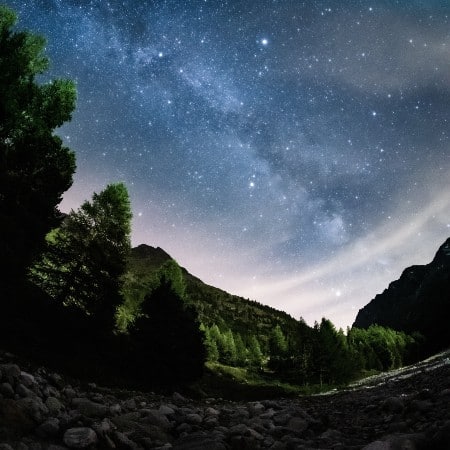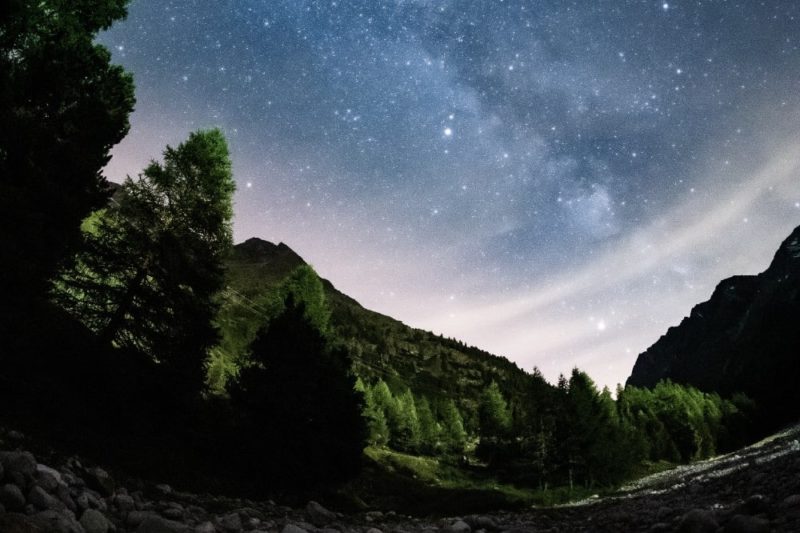There are many natural wonders of the world, visible from the naked eye and often from our own backyards. The mystic wonder of the sky is breathtaking in its beauty, showcasing the best of the moon, the sun, and the stars. In our state of New Jersey, there’s a lot above to look at as the year continues — and we’ve covered when these astronomical events are so you don’t have to miss the next meteor shower visible from NJ. Here is our local New Jersey guide to meteor showers, lunar eclipses, and supermoons in 2022.

Meteor Showers:
August 12th + 13th: The Perseids are famous for producing a large number of fireballs, and are therefore considered one of the best showers of the year. It’s a long-running meteor shower, running from the middle of July to the end of August, but it reaches its peak for New Jersey — which produces up to 60 shooting stars an hour (or one a minute) — around the middle of August. The only problem is a pesky full moon that takes place at the same time, which could present some viewing problems, but the shower is still so bright that it will light up the New Jersey sky.
For those of you spending August down the shore, viewing this meteor shower on a dark beach or rooftop is one of the prime places to watch it in our state.
Read More: How to Celebrate Scorpio Season in Montclair, According to an Astrologer
October 7th: The Draconids are the only annual meteor shower that is best viewed in the early evening hours. It’s relatively minor, so it only produces about ten shooting stars an hour and only runs from October 6th to 10th, reaching its New Jersey peak on the 7th, but the first-quarter moon will present a pretty serious viewing problem.
October 21st and 22nd: Comet Haley is making a New Jersey appearance with the Orionids, a meteor shower that runs from October 2nd to November 7th. It produces, at its peak, about 20 shooting stars an hour, and the thin, crescent moon leaves mostly dark skies, perfect for your viewing pleasure.
November 4th + 5th: The Taurids are a unique and long-running meteor shower that consists of two separate streams. The first steam is created by grain dust left behind by Asteroid 2004/TG10, and the second is made by dust grains left behind by Comet 2P/Encke. It runs for months — from September 7th to December 10th, to be exact — but hits its peak in New Jersey in early November. Unfortunately, though, a nearly full moon will yet again make the viewing experience a little tricky.
November 17th + 18th: The Leonids meteor shower, which runs from November 6th to 30th, hits its peak in New Jersey almost right in the middle of its duration and showcases an average of 15 meteors an hour. But it also boasts cyclonic peaks, which occur roughly every 33 years. In these periods, hundreds of meteors an hour can be seen, the last of which occurred in 2001
December 13th + 14th: The Geminids are touted by meteor experts as hands-down the best show in the sky. They produce a whopping 120 multicolored meteors at the peak, which happens toward the end of its December 7th to 17th run. Even though the bright moonlight will erase the trace of some of the sky’s fainter meteors, many of the Geminids are so bright and bold that it will still be a show to remember.
December 21st + 22nd: The last meteor shower of the year is a minor one. The Ursids run from December 17th to 25th and offer only five to ten meteors an hour. And, unfortunately, a nearly new moon brings dark skies that mask what could have been a good show.
Lunar Eclipses:
After the total lunar eclipse on May 16th, which was visible for all of North America, there’s only one more for the year 2022. It takes place on November 8th and will be visible only to parts of western and central North America. Thankfully, according to a graph created by NASA, New Jersey (narrowly) makes the cut and the lunar eclipse will be visible at moonset.
Supermoons:
A supermoon is when the moon appears to be bigger and brighter than normal, and 2022 brings three such occurrences. A supermoon is a relatively new concept, originally used by astrologer Richard Nolle in 1979 — though it wasn’t popularized until an exceptionally bright moon in March 2011.
See More: Jersey City: The Birthplace of American Astrology
Unfortunately, two of the year’s three supermoons have occurred already, on June 14th and July 13th, with the latter being the biggest supermoon of the year. But with plenty of full moons left before year’s end, there’s still one more opportunity to witness a supermoon, taking place in August. According to Almanac, the August 11th full moon will reach 90% perigee, the moon’s closest approach to earth, and the supermoon will occur at 9:36PM. in New Jersey. At that point, the moon will be 224,569.1 miles from the earth.
















